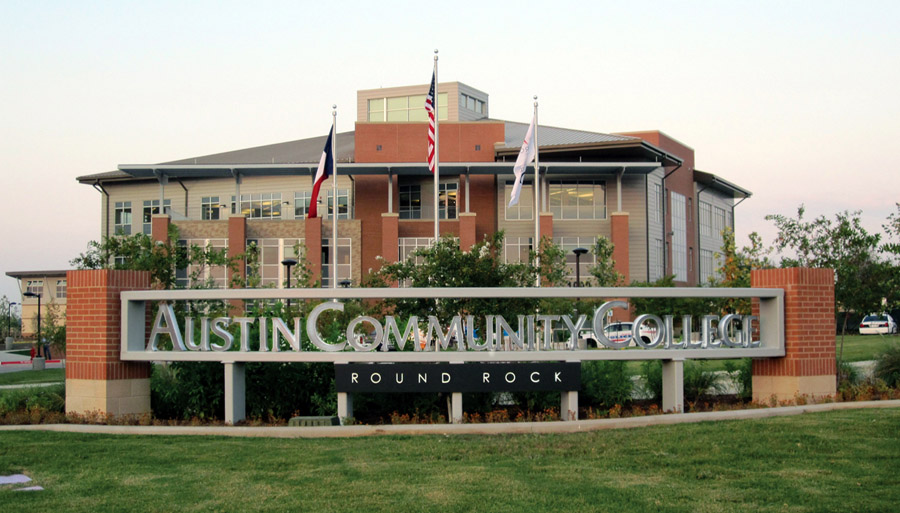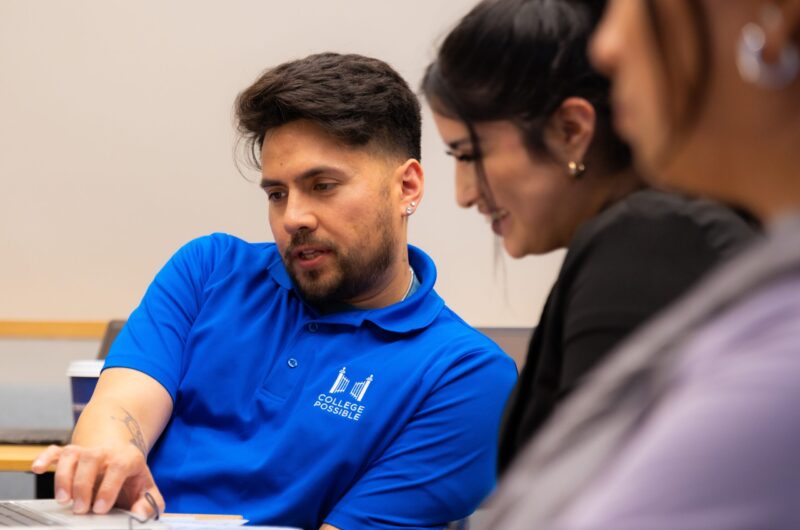Attending a 4-year university straight out of high school (or after completing a GED) isn’t the only way to learn new skills, grow professionally, and prepare for the workforce. There are a variety of credential opportunities that you might not even be aware of! Trade, technical, vocational schools, and certificate programs are fantastic options for those looking for specific careers, hands-on learning, and shorter education commitments.
Before diving in, let’s clear up some terms first:
Types of Credentials
Certificates are a type of credential that involves the successful completion of a brief course of study. It usually takes one year or less to complete. You can earn a certificate through a community college, university extension program, or a non-degree granting postsecondary institution like area career and technical education schools.
A type of credential that indicates mastery or competency in specific knowledge, skills, or processes. It can be obtained through trade schools, community colleges, state examinations, etc. Certifications often require maintaining the currency of the certification (through assessments, training, exams).
Examples of certified careers include: Certified Early Childhood Education Teacher, Certified Welder, and Certified Logistics Technician
Associates Degrees are a type of credential that results in an academic degree for completing a program or courses of study. It usually takes two or more years to complete, depending on a part-time or full-time course schedule.
If you are interested in earning a bachelor’s degree in the future, be sure to ask your academic advisor or CoFo Coach about the differences between associate degrees (some are transfer-friendly, others are not).
“Where can I obtain a credential?” you might ask. See below
Types of Institutions
|
These are a type of institution that offers associate’s degrees and specific certifications necessary to enter technical job fields. Technical school curriculum includes classroom lectures and simulated job training. These programs can often be completed in just 1-2 years (compared to 4-year universities) and for half the typical tuition!
Examples of technical careers include medical assistant and administrator, software engineer, and electrical engineer.
These are a type of institution that teaches skilled trades. They can be thought of as more labor-focused industries with “hands-on” programs of study.
Examples of trade careers include: auto mechanics, electricians, carpenters, welders, etc.
Community College or Junior College
A type of institution that offers Associate degrees as well as certificate and certifications through technical and vocational programs.
If you chose to pursue a Bachelor’s degree in the future, ask a college advisor or your CoFo coach about community colleges that have transfer partnerships with 4-year colleges!
So what types of courses and programs can you take at these institutions? See below!
Types of Courses
| A type of course that can be taken through a community college or vocational school, which provide transferable college credit (certificate, associates degree, bachelor’s degree) |
Technical/Non-credit/Workforce
A type of course that can be taken through a community college or vocational school. Typically only counts towards Certificates and Associate of Applied Science degrees. Does not count towards transfer-friendly associates degrees (Associate of Science, Associate of Arts, etc.) or bachelors degrees and are typically classes that specifically prepare you for the workforce.
NOTE: there are both credit and non-credit certificate program options available
| A type of course or certificate program designed for those who want to obtain career training for immediate employment in specific occupations and generally do not include transferable college credits. They can take weeks to months to complete. |
A type of course or program, usually for coding and other computer and information technology (such as HTML, Javascript, UX/UI Design, Python, etc.) that prepares you for entry-level roles in IT or computer science through a condensed, rigorous format. These programs vary in length and quality based on their content, structure, and admission criteria.
NOTE: Technical certificates from accredited universities are sure to meet current industry standards. Bootcamps are generally NOT regionally or nationally accredited unless they are affiliated with a university!
| A type of course usually taken to satisfy basic learning such as literacy, writing, and math. Other adult education courses include GED test prep programs, which allow adults to earn the equivalent of a high school diploma, and ESL courses, which help adult students learn and improve their English language speaking abilities. |
A type of courses or programs that offer formalized learning and training related to one’s current or future career path goals. Continuing education courses are offered on a non-credit and credit (referred to as CEU’s or continuing education units) basis.
NOTE: CEU’s are different from college credits. CEU’s were originally designed for professionals who had already attained a certain level of education and needed to take a certain amount of continuing education and training per year to renew their license or certification.
A type of course or program that offers professional development and skills needed for in-demand occupations. These courses and programs are open to everyone! They generally do not offer transferable college credits.
Now that we’re all on the same page, go on and explore the following postsecondary opportunity program links!
Photo courtesy of www.austincc.edu.
Austin Community College
ACC offers associate degree and career/technical certificate programs in about 100 areas of study. ACC has 11 campus locations throughout the Austin Metropolitan Area and surrounding Central Texas communities. They provide certificate programs (credit and non-credit options) and Fast Track Career Programs.
Credit certificate programs include:
- Accounting Technician (Bookkeeper)
- Accounting Technician (Quickbooks)
- Logistics and Supply Chain Specialist
- Medical Office Assistant
Computer Skills & Information Technology
- C++ Programming
- Java Programming
- Coder/Designer
- Computer User Support
- Data Science Programming
- Database Programming
- Network Administrator
- Software Testing
- Swift Application Development
- Web Developer
Design, Manufacturing, Construction & Applied Technologies
- Architectural and Ornamental Metals: Blacksmithing
- Architectural and Ornamental Metals: Metal Sculpture
- Basic Automotive
- Auto Body Collision Repair
- Auto Body Repair
- Auto Body Refinishing
- Automotive Technology
- Carpentry
- Construction Manager
- Manufacturing Computer-Aided Design
- Integrated Circuit Layout & Computer-Aided Design
- Architectural Computer-Aided Design/Building Information Modeling
- Civil Computer-Aided Design
- Geographic Information Systems
- Geospatial Engineering
- Heating, Air Conditioning, and Refrigeration Technology
- Advanced Manufacturing
- Medical Devices Manufacturing Technology
- Electronics Technician
- Power Technology
- Renewable Energy
- Inert Gas Welding
- Structural Welding
- Ultra-High Purity Piping
ACC also provides entry-level career certificate programs from Austin Community College’s Continuing Education Division for students interested in joining the workforce ASAP. These non-credit options are designed to prepare you with specific skills sought out by Central Texas employers. These non-credit courses are currently 50% through December 31, 2021!
ACC Fast Track Careers (Non-Credit) programs include:
Design, Manufacturing, Construction & Applied Technologies
- Certified Computer-Aided Design Drafter
- Certified Production Technician
- Heavy Equipment Operator
- Lineworker
- Plumbing
- Truck Driving
- Welding
- Certified Nurse Aide
- Dental Assistant
- Medical Assistant
- Medical Billing & Coding
- Medical Office Support
- Ophthalmic Assistant
- Patient Care Technician
- Phlebotomy Technician
- Veterinary Assistant
Lone Star College
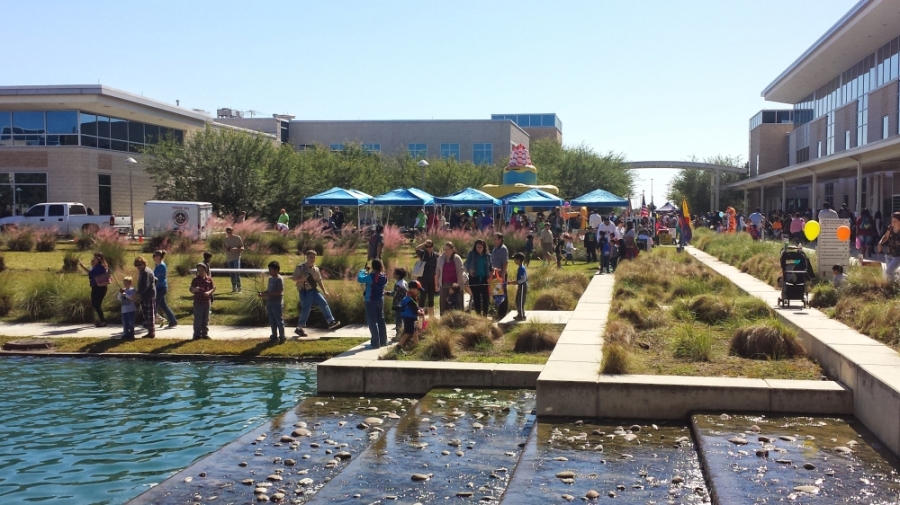
Photo courtesy of www.lonestar.edu.
Lone Star Colleges serve the northern parts of the Greater Houston Area and have 7 campus locations. LSC offers associates degrees , certificate (credit) and Fast Track (non-credit) programs, and even a few bachelor’s degrees.
Check out LSC’s Credit Programs to join the workforce or accumulate transferable college credits:
- Accounting
- Administrative Services
- Automotive Technology
- Biotechnology
- Business Administration
- Computer Information Technology
- Cosmetology
- Dental Hygiene
- Diagnostic Medical Sonography
- Electrical Technology
- Emergency Medical Services
- Energy & Manufacturing Technology
- Engineering Design Technology
- Fire Science
- Game Design & Simulation
- Geographical Information Systems (GIS)
- Health Information Technology
- Heating, Ventilation, Air Conditioning & Refrigeration
- Human Services
- Industrial Electronics Technology
- Land Surveying & Mapping Technology
- Law Enforcement
- Live Entertainment Technology
- Logistics Management
- Machining Technology
- Massage Therapy
- Medical Assisting
- Medical Radiologic Technology
- Nursing
- Occupational Therapy Assistant
- Paralegal Studies
- Pharmacy Management
- Physical Therapy Assistant
- Process Technology
- Respiratory Care
- Surgical Technology
- Veterinary Technology
- Visual Communication
- Welding Technology
Fast Track (Non-Credit) Programs
- Accounting Assistant/Bookkeeper Certificate
- AutoCAD Draftsman Certificate
- Automotive Technician Certificate
- Carpentry I NCCER Residential Certificate
- Dental Assistant Certificate
- Electrocardiography Monitor Technician Certificate
- Electrocardiography Technician Certificate
- Emergency Medical Technician (EMT) – Fast Track
- General Automotive Service Tech Certificate
- HVAC I NCCER Residential Certificate
- Lean Six Sigma Black Belt
- Lean Six Sigma Green Belt
- Project Management Certificate
- Payroll Assistant Certificate
- Mechanical Technician/Mechatronics Certificate
- SolidWorks Designer Certificate
- Texas Teacher Certification: Clinical Teaching Track
- Welding I NCCER Certificate
Tarrant County College
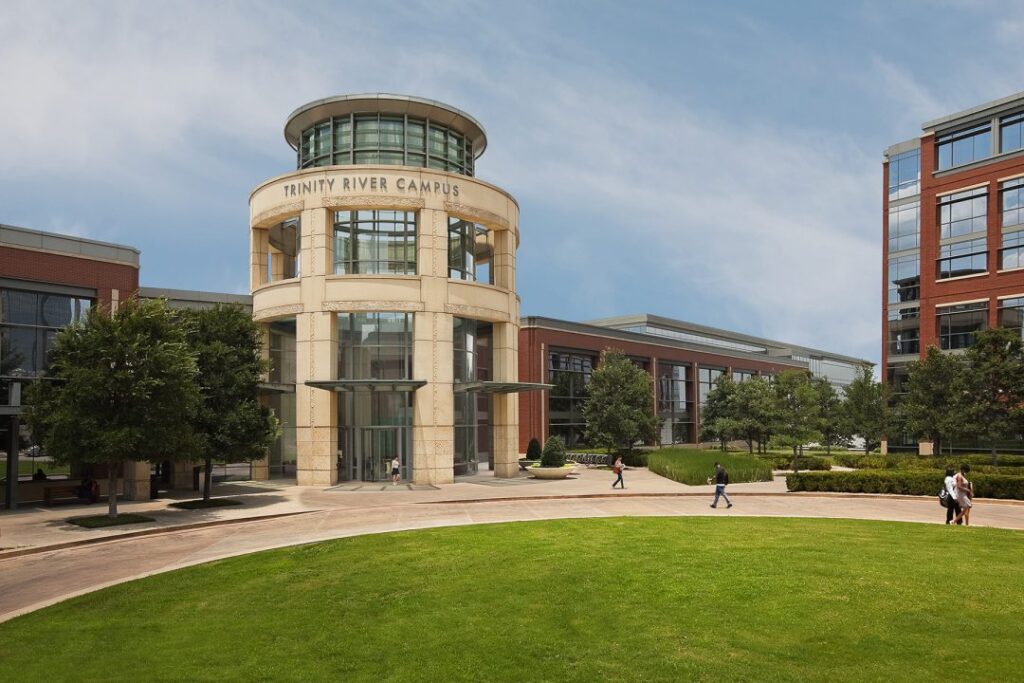
Photo courtesy of www.tccd.edu.
Tarrant County College serves Tarrant County, including Fort Worth, Arlington, and Hurst. It has 5 campus locations. TCC offers associate degrees and certificate programs (credit and non-credit).
Check out TCC’s Credit Programs to earn a certificate and or accumulate transferable college credits:
- Accounting
- Architectural Technology
- Automotive
- Automotive Service Technology: Toyota Technician Education Network (T-TEN)
- Aviation
- Business
- Central Sterile Processing
- Child Development
- Computer-Aided Drafting & Design
- Computer Support Specialist
- Construction Management Technology
- Criminal Justice
- Culinary Arts
- Diagnostic Medical Sonography
- Dietetics
- Electrical Line Technician
- Electronics Technology
- Emergency Medical Services
- Entrepreneurship & Small Business Management
- Fashion Merchandising
- Geographic Information Systems (GIS)
- Graphic Communication
- Heating, Air Conditioning & Refrigeration Technology (HVAC)
- Horticulture
- Hospitality Management
- Human Resources Management
- Industrial Technician
- Information Technology
- Library Technician
- Logistics & Supply Chain Management
- Long Term Care Administration
- Magnetic Resonance Imaging Technology (MRI)
- Management
- Marketing
- Medical Assistant
- Mental Health & Human Services
- Occupational Safety & Environmental Technology
- Office Technology
- Paralegal Studies
- Radio, Television & Film
- Real Estate
- Sign Language Interpreting
- Vascular Interventional Radiography
- Vocational Nursing
- Welding Technology
If you want to learn a new set of skills to enter the workforce for the first time, change careers or pick up a new specialization, check out these Non-Credit Courses & Programs:
- Accounting Technician
- Accounting/Bookkeeping, Beginning
- Accounting/Bookkeeping, Intermediate
- Administrative Assistant
- QuickBooks Accounting I
- QuickBooks Accounting II
Dental Assistant Exam & Certification Prep Courses
- Coronal Polishing
- Dental Assisting National Board (DANB) Exam Review:
- Certified Dental Assistant (CDA)
- National Entry Level Dental Assistant (NELDA)
- Dynamic Digital X-rays
- Nitrous Oxide Monitoring Course & Exam
- Pit & Fissure Sealant
- Registered Dental Assistant (RDA) Course & Exam
- Top-Notch Temporaries
EPA Recovery Certification (HVAC)
Fire Rescue Training—Public Safety Training Center (PSTC)
Health Science Courses & Programs
- Advanced Cardiac Life Support
- CPR for Health Care Providers
- EKG Technician
- Massage Therapy
- Medical Coder
- Ophthalmic Assistant
- Ophthalmic Assistant Training
- Pharmacy Technician
- Phlebotomy Technician
- Registered Dental Assistant (RDA)
- Veterinary Clinical Assistant (CVA)
- CPR for Health Care Providers
- EKG Technician
- Personal Fitness Trainer
- Registered Dental Assistant (RDA)
- Security+
- Society of Human Resource Management (SHRM):
- Startup Entrepreneur
- 3D Entrepreneur
- Training Certification Program
- Water & Wastewater Treatment
Houston Community College
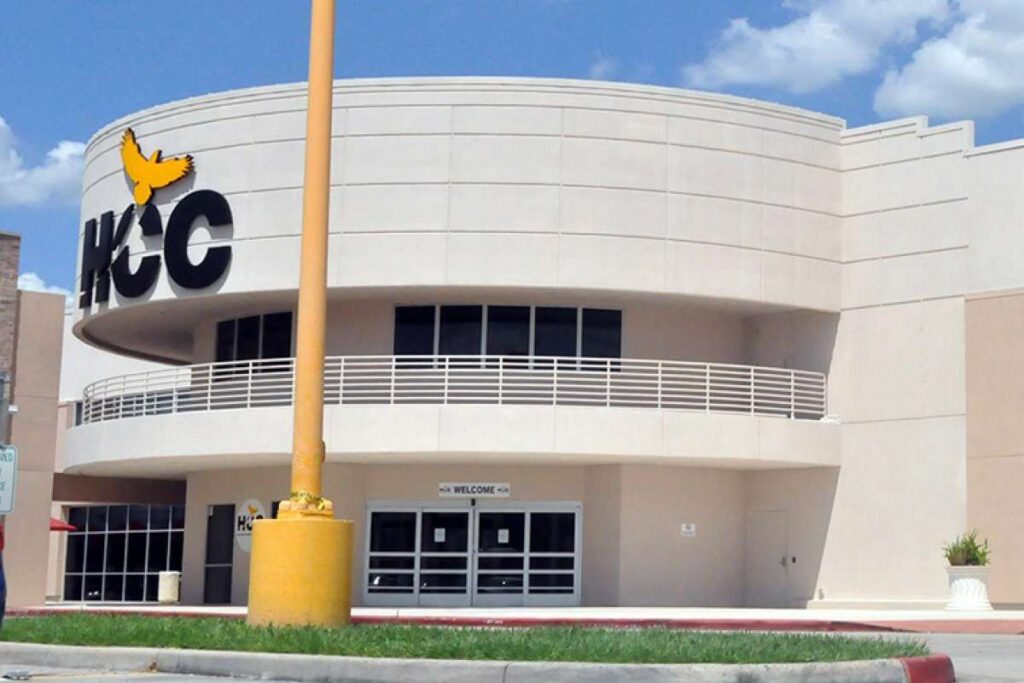
Photo courtesy of www.hccs.edu.
Houston Community College serves Houston, Missouri City, Greater Katy, and Stafford, with 23 HCC campuses throughout these regions. HCC offers associate degrees and extended learning options, such as adult education, continuing education programs, and The Corporate College program (training and development solutions)
They also offer a variety of certificate programs (credit and non-credit options) in the following areas:
- Child Development
- Computer Systems, Networking & Telecommunications
- Construction Management Technology
- Corrosion Technology
- Cosmetology
- Criminal Justice
- Culinary Arts
- Cyber Center
- Dental Assisting
- Health Information Technology
- Heating, Air Conditioning & Refrigeration
- Heavy Vehicle & Truck Repair
- Hospitality Administration
- Human Service Technology
- Humanities/Interdisciplinary Studies
- Industrial Electricity
- Instrumentation & Controls Engineering Technology
- Machining Technology
- Manufacturing Engineering Technology
- Marketing & Marketing Management
- Medical Assistant
- Music Business
- Paralegal Technology
- Pastry Arts
- Petroleum Engineering Technology
- Pharmacy Technician
- Process Technology
Texas State Technical College
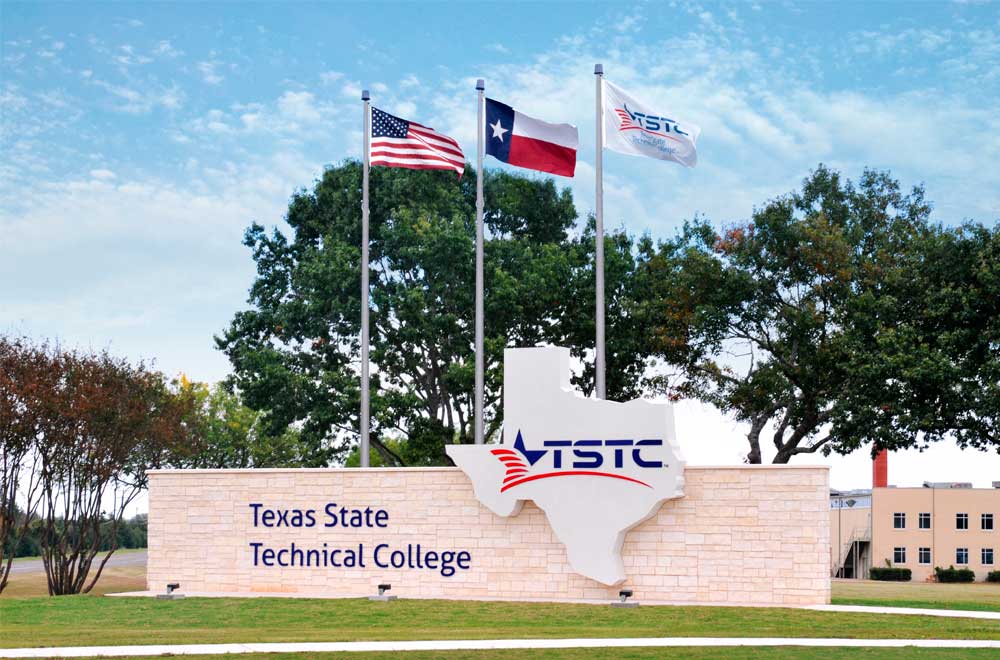
Photo courtesy of www.tstc.edu.
TSTC offers Workforce Training to help you reach the next level in your current job or prepare to start a new career. TSTC also offers Certificate Programs that can count towards an associate’s degree (credit) and certificate level programs (non-credit). Check out their programs:
- Academic Core Curriculum
- Aircraft Airframe Technician
- Aircraft Powerplant Technology
- Auto Collision & Management Technology
- Automotive Technology
- Building Construction Technology
- Business Management Technology
- Chemical Dependency Counseling
- Culinary Arts
- Cybersecurity
- Diesel Equipment Technology
- Drafting & Design
- Education & Training
- Electrical Construction
- Electrical Lineworker Technology
- Electromechanical Technology
- Emergency Medical Services
- Health Information Technology
- HVAC Technology
- Industrial Systems
- Vocational Nursing
- Plumbing & Pipefitting Technology
- Precision Machining Technology
- Energy Efficiency Specialist
- Web Design & Development
- Welding Technology
University Extension Programs

Photo courtesy of www.baylor.edu.
Did you know you can take courses at 4-year universities without undergoing the strenuous application and admissions process? If you’re looking for specialized skills or professional development, check out these university extension programs:
UT Austin – Center for Professional Education
- TXST – Career Professional and Certification Training
- TAMU – Online Courses & Job Training
- UTSA – Career Center Training
- UTA- Continuing Education
- UTD- Certificate Programs
- BU – Continuing Education
- UHD- Continuing Education
- PVAMU- Professional Development
How to Recognize if a Trade School is Trying to Scam You
As always, if you have any other questions or need assistance in applying for these programs, feel free to reach out to your Coach! Or, contact programs@collegeforward.org to get connected to a College Success Coach.
Download our free CoFo Connect App on Google Play or App Store to explore more postsecondary opportunities right at the touch of your fingertips!
